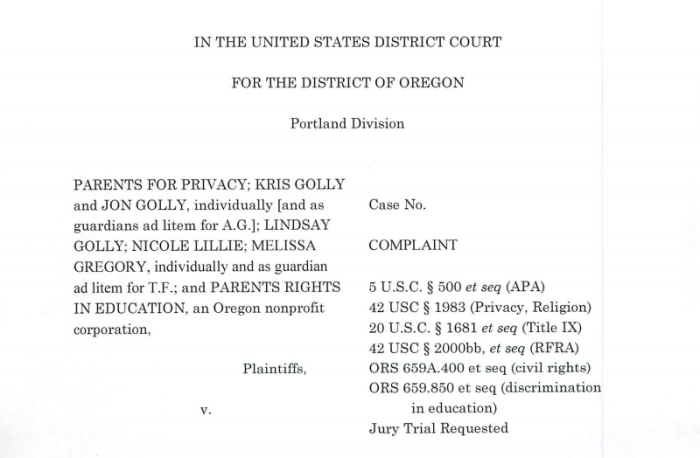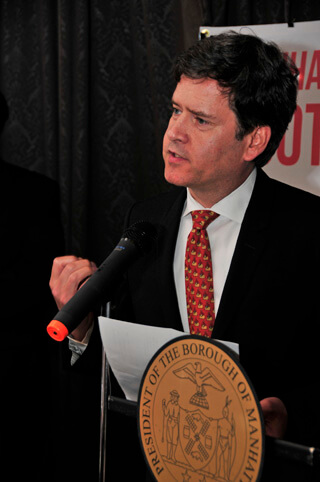BY ARTHUR S. LEONARD | A federal appeals court has revived Will X. Walters’ constitutional claims against the San Diego Police Department in connection with his arrest on “public nudity” charges while wearing what the trial court described as a “gladiator-type black leather loincloth” at the 2011 Pride events in that city.
In an unsigned opinion, a three-judge panel of the Ninth Circuit Court of Appeals found that District Judge Cathy Ann Bencivengo erred in dismissing Walters’ equal protection claim on summary judgment. Walters’ appeal took two years before oral argument was held at the Ninth Circuit, but the panel then took less than a month to find in his favor.
According to the district court’s opinion, police officers met with San Diego Pride organizers about two months ahead of the 2011 celebration, and a staffer told the lead officer that the group was “having issues with the public nudity and they were asking the police department to help get compliance.” The group was apparently concerned that the “family” nature of the Pride events was endangered, and police resolved to be stricter than they had been in the past in enforcing the city’s public nudity ordinance.
Ninth Circuit Court of Appeals overturns dismissal of case against San Diego Police Department
The San Diego law forbids men and women from exposing their genitals or anus and women from exposing their breasts in public.
When Walters bought his ticket and entered the Pride festival, nobody questioned his outfit.
According to Judge Bencivengo, however, “He was inside the beer garden in the festival having his photograph taken by a photographer when Lieutenant [David] Nisleit told him that his outfit was borderline breaking the nudity law,” and Nisleit told him to “cover up.” Nisleit’s account is that Walters responded belligerently, saying, “So either cite me, arrest me, or leave me alone because I’m not interested in your opinion.” Nisleit told Walters that he was the person in charge and his opinion mattered, to which Walters replied, “You’re not a judge, you’re a police officer.”
After Nisleit walked away and conferred with other officers on duty, Officer Debbie Becker went over to check out Walters, and testified that she “saw his butt. The wind blew, and I saw his one buttock… the behind portion of his butt where his buttocks intersected with his leg… I could not see the crack.”
Becker tapped Walters on the shoulder and he was placed under arrest. However, according to news reports, he was not prosecuted, though he was briefly held in the city jail and not provided with anything to wear other than his gladiator outfit.
Walters sued the City of San Diego, the police officers involved in his arrest, and San Diego Pride, Inc. and one of its members, claiming discriminatory enforcement against him of the nudity ordinance, invasion of privacy, and false arrest. He also filed a battery claim against a Pride official he alleged hit him during the arrest process. Walters argued that the police routinely ignored people wearing a lot less at other public venues, contending that the crackdown at the Pride festival was based on anti-gay animus.
In granting summary judgment to the defendants, Bencivengo dismissed the significance of Walters’ allegations.
“There is anecdotal evidence before the Court that individuals wearing less than what Walters wore at the 2011 Pride Event may not have been cited for public nudity at different times and in different settings,” she wrote. “The Court concludes that this anecdotal evidence is irrelevant, confusing, lacking in foundation, and therefore, inadmissible.”
She contended that “unequal treatment that results from laxity of enforcement does not deny equal protection and is not constitutionally prohibited discriminatory enforcement.”
Further, Bencivengo wrote, “Plaintiff proffers no competent evidence from which a reasonable fact finder could conclude that Walters’ arrest was based on his sexual orientation, or that it resulted from an unequal enforcement policy or practice concerning public nudity.”
She also rejected any assertion of a “conspiracy” between the police and the San Diego Pride organizers to “implement an unlawful policy of discriminatory and selective enforcement of San Diego’s public nudity laws.”
The Ninth Circuit’s panel, consisting of Judges Harry Pregerson, Richard Paez, and Jacqueline Nguyen, however, disagreed and reversed Bencivengo, finding she “erred in granting summary judgment” to the city and Lieutenant Nisleit.
“Viewing all the evidence in the light most favorable to Walters, there are material triable issues of fact as to whether the San Diego Police Department (‘SDPD’) adopted a discriminatory policy of selectively enforcing the City’s nudity ordinance at San Diego Gay Pride (the ‘Pride Event’) in 2011,” wrote the court, recounting the testimony about the planning meeting at which Nisleit “announced a new, more restrictive nudity policy for the Pride Event, which required that attendees fully cover their buttocks. Previously, by contrast, SDPD had enforced a ‘one-inch rule’ at the Pride Event, which only required a one-inch strip of fabric covering the center of an attendee’s buttocks. Walters also presented evidence that beachgoers and attendees of other special events in San Diego were in violation of the new nudity enforcement policy, but that SDPD did not increase enforcement anywhere except the Pride Event.”
The Ninth Circuit opinion mentions some of the evidence that Bencivengo omitted from her opinion, such as that “at least 12 to 15 other attendees were warned to ‘cover up,’” and that a police officer referred to Walters as a “drama queen” during his arrest, which the Ninth Circuit found to be “additional evidence of discriminatory purpose.” The court also disputed Bencivengo’s assertion that because the Pride festival was open to everybody, not just gay people, a stricter enforcement policy at that event could not be construed as anti-gay.
“As for discriminatory purpose,” Ninth Circuit panel wrote, “Walters is entitled at the summary judgment stage to an inference that targeting Pride Event attendees is tantamount to targeting gay individuals and individuals who support gay rights.”
Though the city could, at trial, establish that “another purpose motivated their nudity policy at the Pride Event, that question is seriously disputed,” the panel wrote.
So Walters, who is represented by San Diego attorney Christopher Morris, will get a chance at a trial, unless the city offers a settlement offer he can’t resist. This would undoubtedly have to include a commitment from police to refrain from discriminatory enforcement of the nudity ordinance at future Pride events.


































